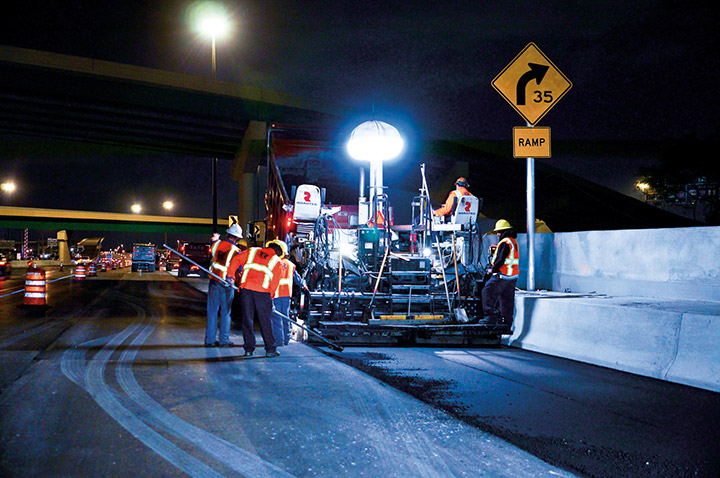Hot Mix Asphalt: Redefining Road Construction Criteria
Warm Mix Asphalt (HMA) is considerably changing the landscape of roadway building practices, establishing new efficiency criteria and reshaping sector requirements. The implications of HMA in redefining roadway construction criteria are profound, offering a compelling instance for a closer exam of its transformative abilities in modern-day engineering techniques.
Advantages of Warm Mix Asphalt
Hot Mix Asphalt (HMA) uses numerous advantages that make it the preferred option for leading roadways. One of the crucial advantages of HMA is its capacity to withstand hefty website traffic loads and severe weather condition problems, making certain lasting performance.
Furthermore, the smooth surface area coating of HMA minimizes rolling resistance, enhancing gas performance for automobiles and reducing general transport costs. The fast building and construction time related to HMA jobs further boosts its cost-effectiveness by reducing labor and traffic disruption expenditures - Hot Mix Asphalt. The recyclability of HMA materials makes it an ecologically lasting choice for roadway building and construction tasks.
Long Life and Toughness of HMA
With a tried and tested track record of withstanding heavy traffic tons and extreme weather condition problems, Hot Mix Asphalt (HMA) stands out for its remarkable durability and sturdiness in road construction tasks. By providing a secure and smooth riding surface for chauffeurs, HMA reduces wear and tear on vehicles and improves total roadway safety and security.

Ecological Advantages of HMA
Increasingly, road building jobs are turning to Hot Mix Asphalt (HMA) for its considerable ecological advantages. HMA is a sustainable paving material that provides a number of advantages in terms of environmental effect. Among the crucial advantages of HMA is its recyclability. The product can be recycled and reused multiple times, minimizing the demand for virgin products and lowering the quantity of waste sent out to land fills. This reusing procedure additionally aids conserve natural deposits and lowers power intake related to manufacturing brand-new asphalt.
Furthermore, HMA pavements are recognized for their capacity to alleviate stormwater runoff. The smooth surface look these up area of HMA roadways enables rainwater to move successfully into the ground, decreasing erosion and lessening the danger of flooding. This can have a positive influence on the bordering ecological communities by keeping natural water flow patterns and protecting the high quality of water bodies.
HMA in Road Building And Construction Projects

Road building tasks profit from HMA's quick building and construction time, allowing for faster completion of roadways and decreasing traffic interruptions. Generally, including HMA into roadway building and construction jobs leads to resilient, cost-efficient, and environmentally friendly roads that fulfill the needs of modern transportation systems.
Effect of HMA on Facilities
The substantial use Hot Mix Asphalt (HMA) in roadway building jobs dramatically influences the overall infrastructure top quality and long life. HMA offers a smooth and resilient driving surface that boosts roadway security by reducing and reducing crashes vehicle damage. This, subsequently, causes lower upkeep expenses for both cars and the road itself. In addition, HMA's versatility allows it to adjust to varying weather, avoiding dig this cracks and pockets that can compromise the structural integrity of roadways.
In addition, using HMA in framework jobs adds to environmental sustainability. HMA is a recyclable product, which means that old asphalt can be recycled in brand-new road building, reducing the requirement for virgin products and decreasing waste. This not just saves natural deposits but likewise lowers the carbon impact connected with road building and construction. In final thought, the impact of HMA on infrastructure is extensive, advertising more secure roads, cost-effectiveness, and environmental obligation in roadway building tasks.
Final Thought
In conclusion, Hot Mix Asphalt (HMA) has proven to be a game-changer in roadway construction criteria due to its unequaled company website effectiveness, durability, and cost-effectiveness. With its capacity to withstand rush hour loads and harsh climate problems, HMA offers a trustworthy and durable option for facilities projects. Its smooth riding surface, resistance to fracturing, and ease of maintenance make it a leading option for improving road security and reducing ecological influence. HMA sets a new standard for lasting and premium facilities advancement.
With a proven track document of enduring hefty traffic lots and extreme weather conditions, Warm Mix Asphalt (HMA) stands out for its extraordinary durability and durability in roadway construction projects.Making Use Of Hot Mix Asphalt (HMA) in roadway building and construction tasks supplies numerous advantages in terms of durability and sustainability.Road building tasks benefit from HMA's quick building and construction time, allowing for faster completion of roads and lessening traffic disruptions.The substantial use of Warm Mix Asphalt (HMA) in roadway construction jobs dramatically influences the overall facilities high quality and long life. In verdict, the impact of HMA on infrastructure is profound, promoting much safer roadways, cost-effectiveness, and ecological duty in roadway construction projects.